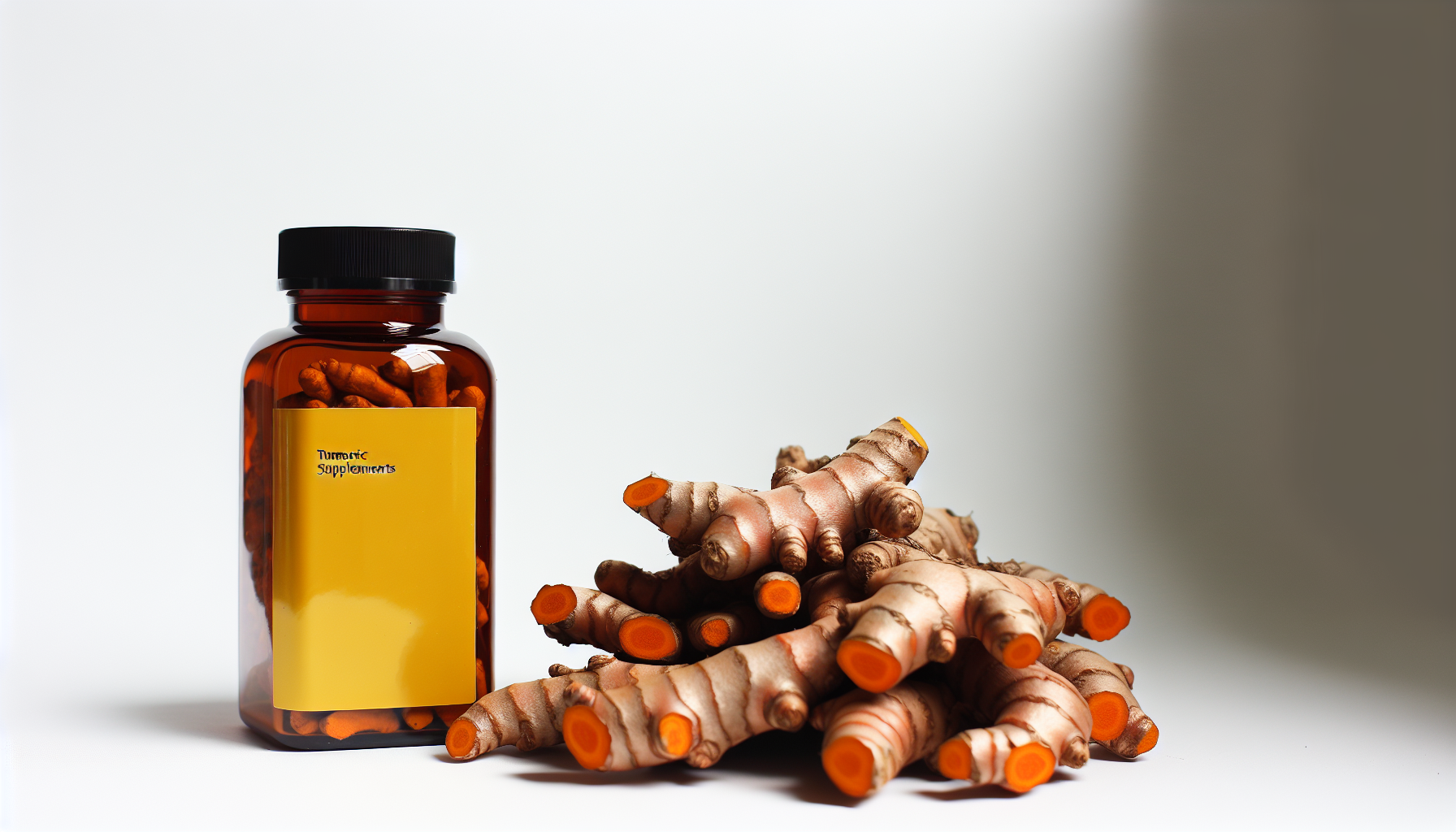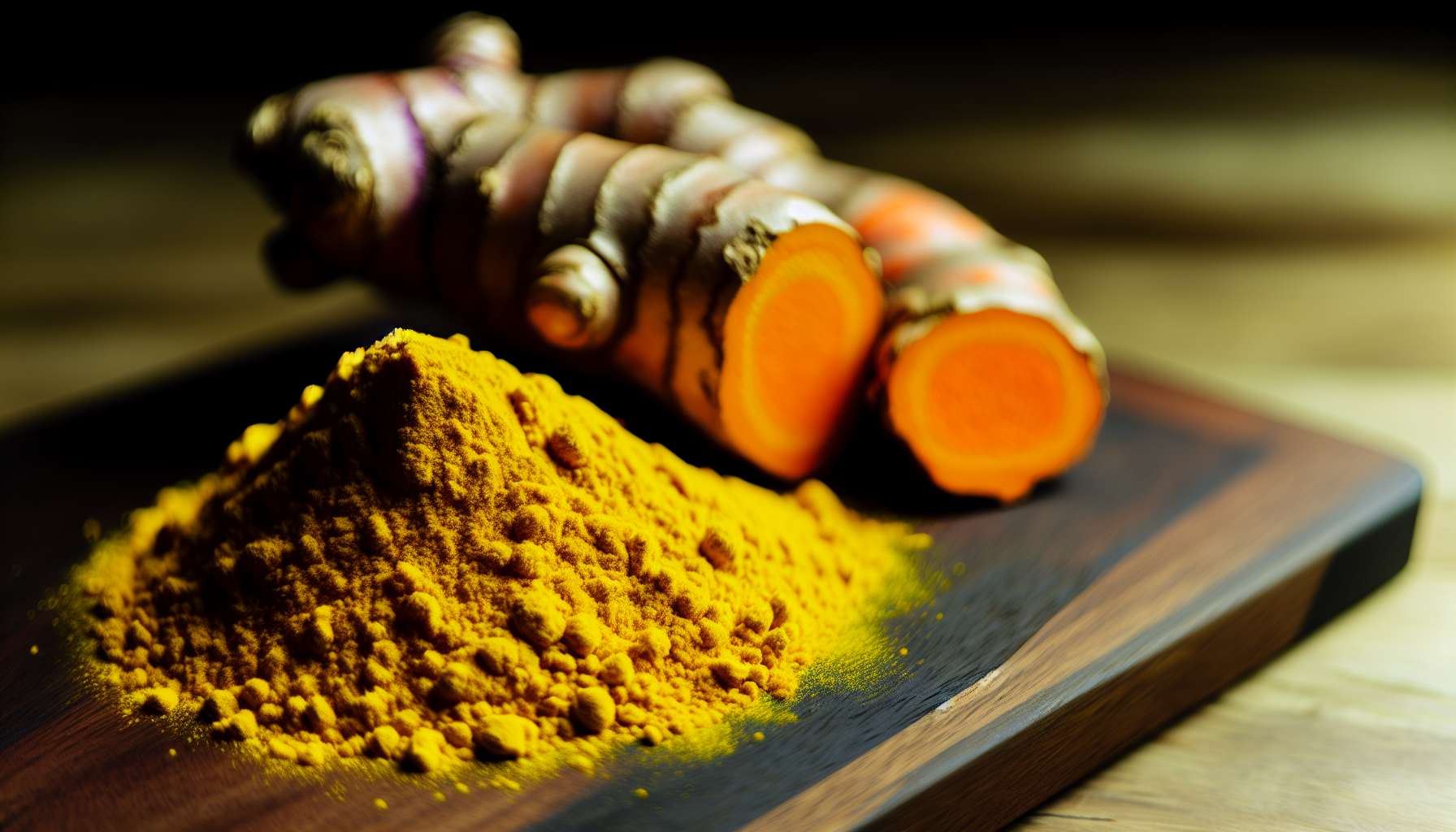Turmeric curcumin, with its radiant golden hue, isn't just a culinary delight but a topic of growing interest in the health and wellness community. So, "Is it safe to take turmeric curcumin everyday?" A question on the minds of many health-conscious individuals. As we delve into this intriguing subject, we aim to offer a comprehensive yet easy-to-understand overview of daily turmeric curcumin usage, its health benefits, and the considerations you should consider. This article is designed to help you balance reaping the benefits of this ancient spice and avoiding the pitfalls of excess.
We'll explore the recommended daily intake of turmeric curcumin, usually around 400-600 mg up to three times a day, and the importance of approaching curcumin supplements with caution due to their unique impact on the body. Highlighting curcumin's role as the active ingredient in turmeric, we'll discuss its enhanced absorption when paired with black pepper and why natural sources like turmeric root or powder are generally preferable to supplements. Additionally, we'll touch on the potential interactions of turmeric with blood-thinning medications and its effect on conditions like kidney stones, ensuring you're well-informed about both the upsides and the cautionary aspects of incorporating turmeric into your daily health regimen.
Key Takeaways
- The recommended daily intake of turmeric curcumin is 400-600 mg up to three times per day. However, caution should be exercised with curcumin supplements, which can affect the body differently.
- Curcumin, the active compound in turmeric, is enhanced by black pepper for better absorption, and natural sources of turmeric are generally preferable over supplements due to potential kidney stone risk.
- While turmeric offers numerous health benefits, including anti-inflammatory and antioxidant effects, it may interact with blood-thinning medications and increase kidney stone risks, thus requiring cautious use by individuals at risk.
Daily Intake Recommendations for Turmeric Curcumin

Turmeric, beloved for its vibrant hue and distinct flavor, is a culinary delight and a health booster. Packed with a powerhouse compound called curcumin, turmeric promises a myriad of health benefits, including:
- Acting as a potent anti-inflammatory agent
- Offering antioxidant properties
- Supporting brain health
- Boosting heart health
- Improving digestion
- Enhancing immune function
But how much turmeric should you consume daily to reap these benefits?
A recommended turmeric curcumin dosage is 400-600 mg, up to three times daily, or a total daily intake of 12 g or less. This dosage is suggested for relieving inflammation, thanks to turmeric’s potent anti-inflammatory properties. It’s important to note that while turmeric is generally safe for daily consumption, one should be cautious with curcumin supplements as they may have different effects on the body.
Next, we examine the active ingredient curcumin content in turmeric, the enhancement of curcumin absorption by black pepper, and the preference for natural sources over supplements.
Understanding Curcumin Content
Turmeric and curcumin are closely related, with curcumin being the star player in turmeric, responsible for the spice’s yellow color and notable health benefits. Acting as a powerful anti-inflammatory and antioxidant, curcumin fights free radicals and reduces inflammation, which can aid in preventing chronic diseases like heart disease and Alzheimer’s.
So, how much curcumin does turmeric contain? Here are some approximate percentages:
- Curcumin typically constitutes approximately 2-8% of most turmeric preparations
- The powder averages just over 3%
- The curcumin content in fresh turmeric is generally higher than in dried turmeric or turmeric supplements.
Given the health benefits of turmeric, gaining insight into the curcumin content in your turmeric source is vital when integrating it into your diet.
The Role of Black Pepper in Curcumin Absorption
Although curcumin is a potent compound, its absorption by our bodies is not optimal. This is where black pepper comes into play. Black pepper enhances the absorption of curcumin, making it more effective in the body. But how does this happen?
The secret lies in piperine, a black pepper substance that enhances curcumin absorption. This mechanism allows the curcumin to bypass the liver, increasing its levels in the blood and enhancing its effectiveness in the body. So, the next time you add turmeric to your dish, don’t forget a pinch of black pepper for that absorption boost!
Opting for Natural Sources Over Supplements
Exploring the world of turmeric, you’ll find a wide range of products, from ground turmeric spice to turmeric supplements. While a curcumin supplement may seem easy to get your daily curcumin dose, taking turmeric naturally, like food, is often safer than taking turmeric supplements.
Turmeric from natural sources is often consumed with fats or oils, which improves its absorption in the body as curcumin, the active compound in turmeric, dissolves in fat. On the other hand, turmeric supplements, which often contain concentrated turmeric extracts, can potentially elevate the risk of kidney stone formation due to their higher concentrations of curcumin compared to that found in food.
Hence, despite the convenience of supplements, combining natural sources of turmeric, such as curry powder, with a touch of black pepper may be a safer and more efficient method to leverage the health benefits of turmeric.
The Spectrum of Health Benefits of Turmeric

With its vibrant golden hue and centuries of use in cooking and traditional medicine, turmeric offers a treasure trove of health benefits far beyond the kitchen. This versatile spice has garnered attention for its role in many health conditions, positioning it as a valuable component in the diets of those prioritizing their well-being. Its capabilities range from diminishing inflammation to bolstering heart health and enhancing brain function, making turmeric an all-encompassing ingredient for holistic health.
In this detailed exploration, we will uncover the diverse health advantages of turmeric. But it's not just about what turmeric can do; it's also about understanding its components, particularly curcumin, the active compound responsible for many of its health benefits. For those especially interested in joint health, we recommend our in-depth article “Which is Better for Joint Pain: Turmeric or Curcumin? The Ultimate Comparison.” This piece offers a focused look at how turmeric and curcumin specifically aid in alleviating joint pain, providing a comprehensive analysis for anyone looking to make an informed choice between these two closely related yet distinct options. 👇
Now, let's examine the spectrum of health benefits turmeric has to offer, guided by both historical wisdom and modern scientific research.
Turmeric's Impact on Heart Disease
Maintaining a healthy heart, being a vital organ, is paramount. For this task, turmeric could be your new best friend. Turmeric, rich in curcumin, may help prevent heart disease by reducing inflammation and improving blood flow.
Curcumin, the active turmeric compound, improves heart health by delaying cellular senescence, reducing oxidative stress, and enhancing antioxidant defense. Turmeric also employs various mechanisms to improve blood flow, such as suppressing vascular contraction, inhibiting vascular smooth muscle cells, enhancing endothelial function in resistance and conduit arteries, and promoting overall blood circulation.
Turmeric’s antioxidant effect plays a role in heart health by bolstering antioxidant defenses, mitigating oxidative stress, and possibly reducing blood pressure.
Curcumin and Brain Health
Beyond heart health, the benefits of turmeric extend to the brain. Curcumin, present in turmeric, is an antioxidant and anti-inflammatory agent that enhances cognitive functions and promotes overall brain health.
Curcumin functions as an antioxidant, anti-inflammatory, and lipophilic agent, safeguarding brain mitochondria, enhancing cognitive functions, memory, mood, and motor behavior, and augmenting cerebral oxygenation and blood flow to the brain. Additionally, it serves to avert and reverse spatial memory deficits and mitigate neuroinflammation, thereby enhancing working memory and mood.
So, adding turmeric to your diet could be smart for your brain health!
Potential Risks and Side Effects of Daily Turmeric Use
Despite turmeric's health benefits, awareness of potential risks and side effects linked to its daily use is essential. These may include short-term adverse effects like nausea, diarrhea, and headaches, and interactions with certain medications, particularly blood thinners.
Regular usage of turmeric could also heighten the risk of kidney stones. Let’s investigate these potential risks further.
Interactions with Blood Thinning Medications
Turmeric is a natural blood thinner, which might benefit some but can pose a risk for those on blood-thinning medications. Its interaction with these medications can increase the risk of bleeding.
Specifically, turmeric or curcumin should be used with caution when taken with blood-thinning medications such as warfarin, clopidogrel, and aspirin. This is because curcumin has antiplatelet effects, and when combined with medications for diabetes, turmeric could further reduce blood sugar, leading to hypoglycemia.
So, discussing turmeric consumption with your healthcare provider is best if you're on blood-thinning medications.
The Risk of Kidney Stones
High oxalate content in turmeric may contribute to the formation of kidney stones. Oxalate, a compound found in turmeric, can accumulate in the body and form crystals, which can then coalesce to create kidney stones.
The oxalate content in turmeric can vary, particularly between whole turmeric and supplements. The intake of supplemental doses of turmeric can notably elevate urinary oxalate levels, consequently heightening the risk of kidney stone formation. Conversely, certain curcumin products derived from turmeric may contain minimal to no oxalate.
So, if you’re prone to kidney stones, monitoring your turmeric intake and selecting low-oxalate options is best.
Who Should Be Cautious?
While turmeric is generally safe for most people, certain individuals must be cautious. These include those with gallbladder issues, diabetes, or those who are pregnant or nursing.
Let’s explore why these groups must be cautious about their turmeric consumption.
Turmeric and Gallbladder Concerns
You might need to limit your turmeric consumption if you have gallbladder issues. This is because turmeric may exacerbate existing gallbladder problems.
While curcumin treatment has been shown to enhance bile production, its use as a dietary supplement could exacerbate the condition of individuals with gallbladder problems. Therefore, discussing turmeric consumption with your healthcare provider is advisable if you have gallbladder issues.
Turmeric and Diabetes Management
Turmeric may lower blood sugar levels, which, while beneficial for some, can be a concern for individuals with diabetes. Therefore, if you have diabetes, it’s important to monitor your turmeric intake and consult a healthcare professional.
Curcumin, the active compound in turmeric, has been shown to improve insulin sensitivity, counteract insulin resistance, and potentially enhance overall glucose control. However, there is a possibility that turmeric could enhance the effects of diabetes medications, potentially causing hypoglycemia or dangerously low blood sugar levels. Therefore, if you’re managing diabetes, be sure to talk to your doctor before increasing your turmeric intake.
How to Incorporate Turmeric into Your Diet

With this wealth of information on turmeric, you may be curious about how to incorporate it into your diet. Fortunately, turmeric’s incredible versatility allows it to be added to various savory and sweet dishes.
But what’s the best way to store this valuable spice to preserve its freshness? Let’s explore this.
Creative Culinary Uses
Turmeric doesn’t just have to be reserved for curries and stews. Its subtle flavor and vibrant color make it a fantastic addition to various recipes.
Some delicious ways to incorporate turmeric into your meals include:
- Turmeric scrambled eggs
- Pork skewers with couscous salad
- Turmeric macarons
- Mango and ginger ice creams
You can add turmeric to your morning smoothie or latte for a health boost. Remember, a little turmeric goes a long way, so start with small amounts and adjust to taste.
Storing Turmeric Properly
As with any spice, proper storage of turmeric is crucial to maintain its freshness and potency. But how do you store turmeric properly?
Turmeric should be stored in a cool, dry location, or you can freeze it in freezer bags to preserve its freshness for up to six months. Freezing turmeric roots does not result in any alteration of their nutritional value. Ground turmeric can be stored for several years if stored in a dark cupboard, but it may gradually lose potency over time.
Whether you choose fresh or ground turmeric, proper storage is key to maintaining its vibrant color and health benefits.
Complementary and Integrative Health Approaches
Beyond its culinary uses, turmeric is also making waves in the field of complementary and integrative health approaches. Its health benefits, supported by numerous randomized clinical trials, make it a promising addition to non-mainstream therapies.
Let’s further explore the scientific evidence supporting the health benefits of turmeric.
Evidence from Randomized Clinical Trials
The health benefits of turmeric aren’t just hearsay. They are backed by rigorous scientific evidence from randomized clinical trials, considered the gold standard in evaluating the effectiveness of treatments.
These trials have demonstrated that turmeric curcumin may have therapeutic benefits against various diseases, such as:
- cancer
- cardiovascular diseases
- diabetes
- arthritis
- neurological diseases
The significance of these trials lies in their design: they randomly assign participants to receive either the treatment (in this case, turmeric curcumin) or a placebo and then analyze the resulting health outcomes.
The results from these trials provide solid evidence of turmeric’s benefits, making it a promising complement to traditional colorectal cancer treatment.
Wrapping Up - Turmeric/Curcumin and its Many Benefits
In our journey through the world of turmeric, we've discussed its many facets: from how much to take daily to its array of health benefits and potential risks, all the way to its delightful culinary applications. This golden spice, teeming with curcumin, boasts notable anti-inflammatory and antioxidant benefits. Yet, it's crucial to approach its use with care, especially for those with specific health conditions like gallbladder issues and diabetes or for pregnant or nursing individuals.
Turmeric transcends its role as a mere ingredient in your spice rack, emerging as a scientifically supported ally for health and well-being. While mindful of its possible risks, integrating turmeric into your diet under the guidance of a healthcare professional can unlock myriad benefits. Whether adding a sprinkle of this golden wonder to your meals or savoring a warm cup of turmeric tea, it’s an inviting way to enhance your health naturally.
For those interested in diving deeper, particularly in the context of joint pain and inflammation, we invite you to explore our article “The Top Turmeric/Curcumin Supplements For Joint Pain And Inflammation.” This resource will guide you through the best available supplements, helping you decide on your needs. 👇
So, why wait? Embrace the golden goodness of turmeric and discover how this ancient spice can be a modern-day remedy in your wellness journey.
Frequently Asked Questions
What happens to your body when you take turmeric every day?
Taking turmeric daily can protect the body by neutralizing free radicals and shielding the cells from damage. It is associated with preventing medical conditions such as cancer and heart disease. Additionally, it has scientifically proven health benefits, such as improving heart health and potentially preventing Alzheimer's and cancer.
Can you take turmeric curcumin long-term?
It is generally safe to consume turmeric in food, but taking large amounts of turmeric and curcumin in supplement form for an extended period may cause stomach issues and, in extreme cases, ulcers. If you have gallstones or bile passage obstruction, it's best to consult with a doctor before taking turmeric.
How much turmeric curcumin should I take daily?
Experts recommend taking 500 mg of high-quality curcumin twice daily to be safe and effective. Ensuring the supplement is independently tested for authenticity and toxic metals is important.
How does black pepper enhance curcumin absorption?
Black pepper contains piperine, which enhances the absorption of curcumin, increasing its effectiveness in the body.
What are the potential risks of daily turmeric use?
Daily turmeric use can lead to short-term adverse effects like nausea, diarrhea, and headaches. It may also interact with certain medications, particularly blood thinners, increasing the risk of kidney stones. Be cautious when using turmeric daily, as it may have potential risks.
Thanks for taking this journey with us to explore the many benefits of Turmeric / Curcumin. And, if you want to add to your library of knowledge, you should check out the other articles mentioned and linked above. It never hurts to add to your knowledge arsenal!
Also, please return soon to check out our next review of another incredible supplement – we’re always looking out for YOU!
*We are not qualified medical advisors. The content here is only based on our personal opinions and should NOT be used as a substitute for a healthcare professional's advice!











Member discussion